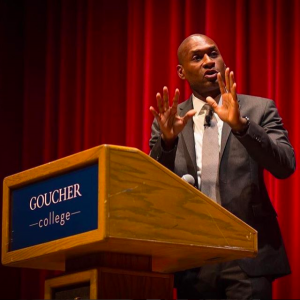On November 1st, visual op-ed columnist for the New York Times, political commentator, and best-selling author, Charles M. Blow, was invited to lecture in Meyerhoff. Addressing the Goucher and wider Towson community, Blow framed his discussion within the context of relationships, resilience, and reflection; a motto adopted by Goucher to describe the ideal outcomes students would gain from their education. While the three Rs were originally meant for usage in an academic setting, Blow applied them to his philosophy behind the fight for equity in an unjust society.

Goucher prides itself on its sense of community. In reference to this, Blow began his remarks on with his own thoughts about communities. He pointed out the need for communities that stretch across identity. These types of communities don’t occur as naturally as would be hoped, which Blow explained was the result of an age old idea that “sameness is safety”. As humans, Blow stated, we are attracted to people who are similar to us, and congregate in such groups. He argued that these groups rob us of something important: growth and empathy towards others.
‘Privilege’ and ‘oppression’ were two frequent terms that Blow used. In his remarks, Blow borrowed the words of Toni Morrison to describe racism as “a robbery”. Blow expanded the use of the word to encapsulate all kinds of oppression and to capture a core idea of why these oppressions must be fought against. Discrimination robs us of time, energy, motivation and other personal facets that could have been used in a more productive way, he argued. In this sense, it hurts the whole of society, not just the individuals specifically targeted by it. It must be actively combatted. “Inaction is a choice,” he stated. “If you are not totally against oppression, you are for it.”
Blow regarded the recent election “backlash” as nothing new. He cited it as a pattern that has always been a part of American history. He described the battle for equity as “messy” and a necessary process where “feelings will be hurt.” Blow’s stance on the necessity of open expression is one that has been interpreted by some as a critique of “sheltered spaces” often associated with liberal arts colleges like Goucher. Blow emphasized that the emotional pain associated with open discussions must be felt in order for real progress to be made. “Fragility cannot be the frame for these discussions,” he said. Though he did not state it explicitly, he seemed critical of the concepts that drive ideas like safe spaces and affinity meetings. He argued that fragility made discussion untruthful by leading people to lie to try and make others comfortable. “You have to be hurt,” he emphasized.
Blow also made a few humorous remarks on politics. “You may have heard, I have a few thoughts on that,” Blow joked when he first brought up the topic. Blow commented on politics when he began answering audience questions. Blow discussed the role of media coverage in politics, particularly during an administration in which the president is an avid tweeter. Blow felt he had an obligation as a journalist to cover Trump’s tweets, yet he made it clear that the president’s behavior, especially toward his disabled colleague Serge Kovaleski, was completely inappropriate.
Another topic brought up through audience questions was the current state of news and media organizations, something which Blow had surprisingly left out of his initial remarks. Blow was particularly critical of news organizations preventing minority reporters from covering stories within their communities. He explained that by assuming minority reporters are “biased” towards other minorities, news organizations are simultaneously claiming that being white, cis, male, Christian, etc. is a “neutral” position. He also criticized the trend toward “snap news”, which is characterized by shorter and shorter segments and “Yelling, yelling, yelling,” as he described.
As his final comments for the evening, Blow reflected on what the end result of advocacy for social justice would look like; What would an equitable world look like? “Liberation looks like the truth,” he finally said.
